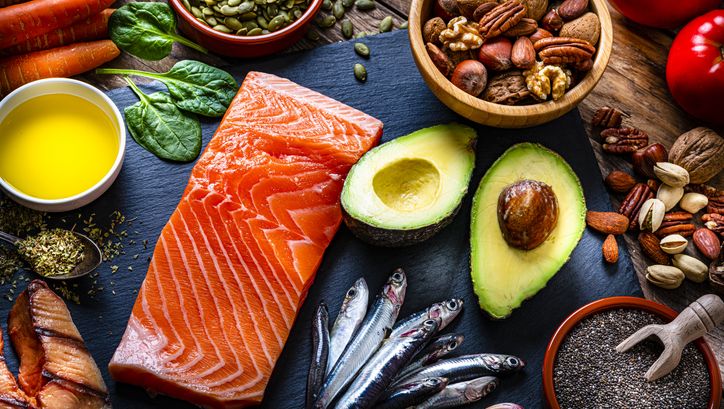CHOLESTEROL IS A WAXY substance that’s found in your cells and actually has several important functions in the body. Cholesterol attaches to proteins, called lipoproteins, to move through your bloodstream. There are two types to be concerned about.
The first is low-density lipoprotein, or LDL, which is considered bad cholesterol and can cause fatty buildup of plaque in your arteries. This can narrow the arteries and restrict blood flow and oxygen to your heart, increasing your risk for a heart attack, stroke, or peripheral artery disease, according to the American Heart Association.
The second type is high-density lipoprotein, or HDL, is often called good cholesterol. It’s believed that a healthy level could reduce your risk of a heart attack or stroke, according to AHA. While HDL moves LDL cholesterol away from the arteries to the liver, where it’s broken down and removed from the body, it doesn’t completely eliminate LDL cholesterol.
“The role of HDL is far less well understood than LDL,” explains Peter Attia, M.D., in his book Outlive: The Science and Art of Longevity.
Having an LDL of less than 100 milligrams per deciliter (mg/dL) has been linked to a lower risk of cardiovascular events. And, people with a higher HDL, above 40 mg/dL, may have a lower risk for heart attack and stroke.
“Risk does seem to decline as HDL rises to around the eightieth percentile,” Dr. Attia writes. “But simply raising HDL cholesterol concentrations by brute force, with specialized drugs, has not been shown to reduce cardiovascular risk at all.”
Still, making lifestyle changes to raise your HDL cholesterol can benefit your health, especially when it lowers your LDL cholesterol, says Bibhu Mohanty, M.D., a cardiologist and associate professor of medicine at the University of South Florida. “If you drop your bad cholesterol, things will improve long term.”
Here’s what you should know about increasing your HDL cholesterol, including how to do it.
What Are the Benefits of Increasing HDL Cholesterol?
HDL carries the excess cholesterol in your blood back to your liver, where it breaks down and is removed from your body. But, scientists remain unsure whether raising HDL alone (and not also lowering LDL) can help reduce your risk for cardiovascular disease.
“We haven’t been able to demonstrate that increasing HDL definitively correlates with good health outcomes,” Dr. Mohanty says. “The opposite is true with bad cholesterol. If we reduce bad cholesterol, we know that good things happen, or those bad outcomes are reduced. But with HDL, it’s been harder to prove.”
Some research has found that raising HDL might not make any difference in heart disease risk, and people who genetically have higher HDL levels don’t necessarily have less heart disease than those with naturally lower levels.
Taking medications to increase HDL also might not necessarily reduce your risk for a heart attack.
“There have been a whole host of HDL-increasing therapies that have been trialed—from nutritional things to genetically modified proteins to infusions of HDL—and none of them have really panned out,” Dr. Mohanty says. “Part of the reason for that is that it’s more complex than just a good-bad molecule.”
Dr. Attia writes that a better understanding of HDL and how to “enhance its function” is needed to make progress in attacking cardiovascular disease.
How to Raise HDL Cholesterol
Even if it’s not fully understood whether directly raising HDL cholesterol has an effect on your health, it is well-documented that lowering your LDL cholesterol does, Dr. Mohanty says. So, making some lifestyle changes can benefit your overall cholesterol levels:
Eat More Fiber
“Fiber has been shown to help lower the LDL and, as a benefit, that helps increase the HDL,” says Amy Kimberlain, R.D.N., a spokesperson for the Academy of Nutrition and Dietetics.
She suggests cutting back on refined carbohydrates and switching to whole grains, fruits, and vegetables to increase your fiber intake. Men need 30 to 38 grams of fiber a day, and women need 21 to 25 grams.
Fiber traveling through the gut traps bad cholesterol and helps you excrete rather than absorb it, Dr. Mohanty says. Plus, the antioxidants in fruits and vegetables have been shown to increase HDL.
Embrace a Pescatarian Diet
Eating more fish, and less red meat, has been shown to raise HDL cholesterol. A 2016 study published in the British Journal of Nutrition found that an increased intake of fatty fish, like salmon, increased HDL and reduced triglycerides, a type of fat in your blood, compared to lean meat intake.
Use Healthy Oils
“Good fats,” like olive oil, flaxseed oil, and other plant-based oils, can help HDL and LDL cholesterol, Dr. Mohanty says. Research published in 2019 found that olive oil polyphenols increased HDL and helped reduce inflammation.
Saturated fats, such as butter, animal fats, and coconut oil, have been shown to increase LDL cholesterol, which raises your risk for cardiovascular disease.
Drink Alcohol in Moderation
Drinking alcohol, especially red wine, can potentially raise HDL. Research suggests that it’s due to the antioxidant compound resveratrol, which is also found in grape juice, blueberries, and dark chocolate.
“If you don’t currently drink, do not begin drinking for this benefit,” Kimberlain adds. If you do drink, remember that moderation means no more than two drinks a day for men and one for women.
Exercise More Frequently
Regular exercise is good for your heart health, and vigorous exercise and endurance training have been shown to increase HDL. “But, the truth is, any exercise is better than no exercise,” Kimberlain says. “As I tell my patients, find the movement that brings you joy.”
Whether it’s going for a walk, spin class, or weight lifting, choosing a physical activity that you enjoy means you’ll more likely incorporate it into your routine, she adds.
Maintain a Healthy Weight
Improving your diet and exercising more will help you maintain a healthy weight, which will benefit your overall cholesterol. Losing 5 percent to 10 percent of your current weight will help increase HDL cholesterol and lower blood pressure and blood sugar, according to Harvard Medical School.
“More reason to take a look at our habits and see where we might be able to make a change,” Kimberlain says.
Stop Smoking
Smoking is linked to a number of health problems, including cancer and heart disease. So, when you quit, it improves heart health and can raise HDL cholesterol, Kimberlain says. Research shows that ex-smokers tend to have higher HDL cholesterol than smokers.
Talk to Your Doctor About Medication
If you’ve tried making lifestyle changes to raise your HDL and lower your LDL and they’re not working, Dr. Mohanty suggests talking to your doctor. You might need to take cholesterol-lowering medications, such as statins.
How Easy Is It to Increase HDL Cholesterol?
It can take a few weeks to a few months to see improvements in your cholesterol levels, Dr. Mohanty says.
“Typically, we’ll give them at least three months, if not more, to institute some lifestyle modifying factors and then test again and see what kind of changes they’ve made,” he adds.
Sometimes, people are prescribed medication, while also being encouraged to make lifestyle changes, like increasing fiber, exercising more, and improving diets overall, Dr. Mohanty adds. Raising HDL doesn’t always directly lower LDL cholesterol, however.
Erica Sweeney is a writer who mostly covers health, wellness and careers. She has written for The New York Times, HuffPost, Teen Vogue, Parade, Money, Business Insider and many more.







Comments are closed.